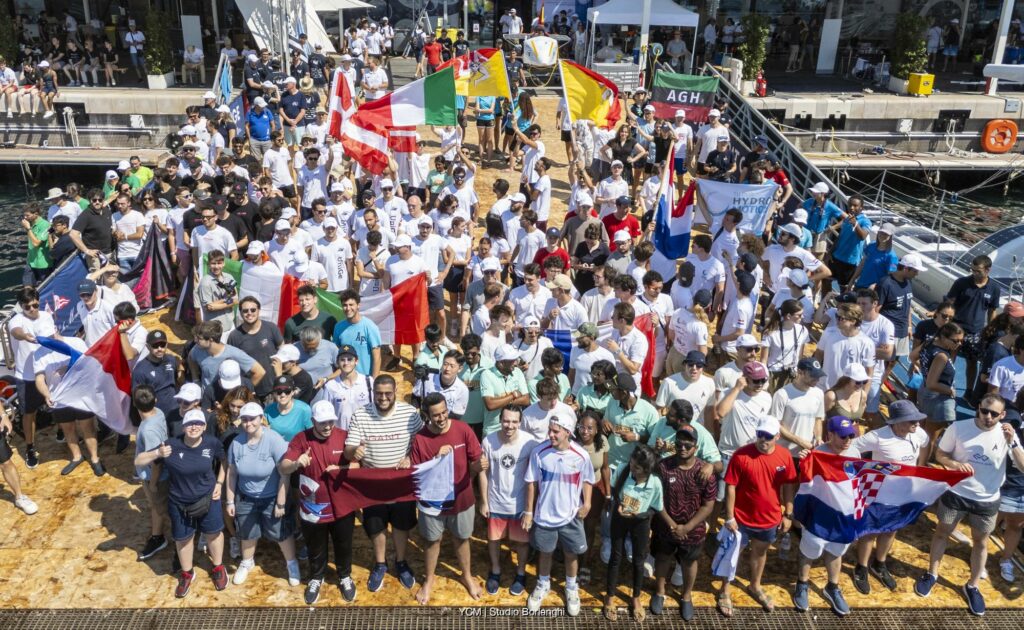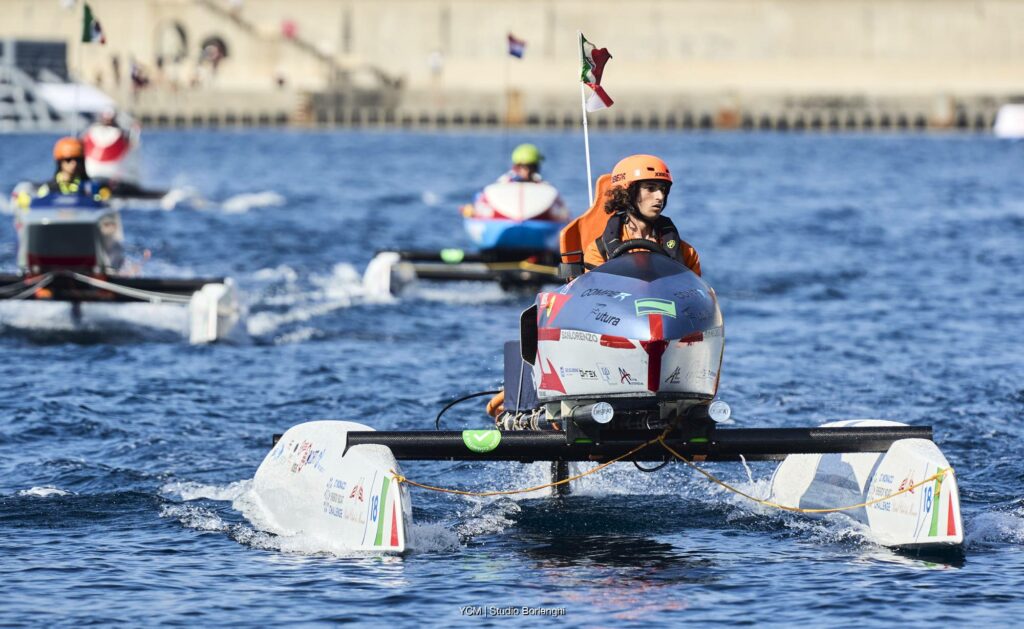After four days of on-water challenges and discussions, the curtain has fallen on the 12th Monaco Energy Boat Challenge. Organised by Yacht Club de Monaco, with support from the Prince Albert II of Monaco Foundation, UBS, BMW and SBM Offshore, it is now firmly established as the big event for imagining and testing the latest evolutions in cleaner propulsion. Major industry players and young engineers combined their expertise to accelerate the sector’s energy transition. This year again YCM President HSH Prince Albert II of Monaco came to meet the students, stopping in every paddock to learn more about the latest developments and kick-off the championship finale in a highly charged atmosphere among the teams. “Technologies are advancing, the ideas also, now we must speed up. We all have a role to play – institutions, manufacturers, owners – it’s time to turn intentions into actions,” says Yacht Club de Monaco General Secretary Bernard d’Alessandri.
Among teams competing, some again pushed technologies to the limit, particularly in the Energy Class which numbered 20 entrants. In four years, battery storage capacity has almost doubled for the same weight while also improving safety, a sign that tangible progress has been made. The event also reached a milestone in terms of participation, with more boats competing and growing industry involvement.
New this year was the introduction of the AI Class for autonomous boats. Inspired by technologies from the drone sector, this class showcased boats that can manoeuvre, dock and perform missions completely autonomously, thanks to systems incorporating sensors and artificial intelligence. The aim of this innovation is to advance the whole sector by facilitating adoption of these new technologies.
In terms of propulsion systems, interest in hydrogen-powered internal combustion engines is growing. Considered a promising avenue for retrofitting into existing yachts, it could represent a credible alternative to conventional engines. Meanwhile fuel cells, which are lighter and more efficient than ever before, continue to make great strides and technologically are starting to rival batteries. At the same time, innovative materials are being developed such as balsa fibre used by several teams this year. “It’s an excellent alternative between glass and carbon with very good mechanical performance, limited environmental impact, and at an affordable price. It’s a good path to take for the maritime industry in the short to medium term,” says Jérémie Lagarrigue, CEO of EODev and chair of the Jury Committee.
Divided into four categories, teams were exploring technologies for the future of yachting:
• AI Class: fully autonomous boats piloted by artificial intelligence,
• Energy Class: standardised hulls testing different technologies onboard,
• SeaLab Class: floating laboratories which this year focused on pioneering projects using hydrogen,
• Open Sea Class: CE certified zero-emission prototypes up to 25m that can take at least three people.
Out of all those competing, 30 boats were powered by electricity, 12 used hydrogen and 12 prototypes were employing foils. The sharing of expertise in Tech Talks in open source was reflected in the paddocks where the Indians from Sea Sakthi came to the aid of the French from Néréides. For half the members of the Indian team, it was their first trip abroad.
Artificial intelligence confirmed its role in energy management on boats, particularly the systems able to optimise the charge and use of batteries in real-time, improving performance and autonomy.
Hydrogen technologies continue to gain in maturity, notably with the arrival of liquid and solid-state storage solutions.
Development of toroidal propellers capable of reducing underwater noise pollution by 50-80%, a crucial issue for marine life as it constitutes a real danger for ecosystems.
“The innovations presented are shaping the future of sustainable marine design. Enabling teams to measure and understand the environmental footprint of their boats from the outset isn’t just helpful, it’s fundamental. Life cycle thinking helps us move beyond hypotheses, ensuring that progress is data-driven and that every design choice leads us closer to low-impact marine solutions,” says Lizzy Howard, Project Manager Marine Futures at Marineshift360, involved in the Eco-Conception Prize, won this year by Elettra UniGe – Università di Genova.

At sea and ashore the challenges and spectacle lived up to expectations with the YCM E-Boat Rallye, speed records, endurance and slalom trials. New this year were the manoeuvrability trials for autonomous boats using AI. The reliability and performance of prototypes developed by students and the industry were really put through their paces.
In terms of pure speed, the record 48.6 knots was beaten by Frauscher Boats (Open Sea Class) who peaked at 49.84 knots. Vita AX/E (46.28 knots) in the Open Sea Class and Inocel (44.18 knots) in the SeaLab Class, completed the podium. In the Energy Class, the Italians from UniBoAT – University of Bologna Argonauts Team clocked a top speed of 26.63 knots, well above the 20.79 knots achieved by the first in the Energy Class last year, as did Elettra UniGe – Università di Genova ahead of the Croatians from Adria Racing – Association of Applied Technical Sciences (25.92 knots). The fact these performances continue to notch up is testament to the technical maturity of projects and growing involvement of schools, universities and industry stakeholders.
Supported by Sanlorenzo, they remain the undisputed masters of this event as evidenced by all the wins and prizes in their category, the Energy Class. Winners of the slalom and endurance event, first in the speed record tied with compatriots Elettra UniGe – Università di Genova, and winners of the Innovation Prize and Design Prize, the Italians from UniBoAT – University of Bologna Argonauts Team impressed everyone at sea and ashore. Their dominance is based on an accomplished, seamless technical approach: propulsion system design optimised to maximise manoeuvrability, a high-performance reliable battery, fine-tuned transmission system, and above all in-house development of a counter-rotating traction engine that ensured outstanding performance. Added to all that, a lighter boat and rigorous training regime for the pilots made all the difference against very high-level opponents.
A symbol of the energy transition in this market, this year Energy Observer played a key role at the Monaco Energy Boat Challenge. Moored in the YCM Marina all week, the catamaran opened its doors to participants and the general public. A bridge between research, innovation and the new generation of students, who were able to experience first-hand the technologies they are experimenting with in the paddocks. For many it was their first opportunity to board this iconic ambassador of sustainable maritime innovation. A reminder that this is the first energy-autonomous vessel, powered by a mix of solar, wind, hydro and hydrogen produced on board. Since 2017, this floating laboratory has covered over 68,000 nautical miles and visited more than 50 countries and proved the reliability of zero-emission technologies in varied conditions.
Through the event’s Corporate Mentoring Programme, major players in the sector including Monaco Marine, SBM Offshore, Sanlorenzo and the Azimut |Benetti Group have been supporting students, providing them with expertise and technical resources throughout the year. The Job Forum was again a big success in its role helping students to find jobs and internships, with 90 interviews held this year. The success of this 12th edition confirms its stand-alone status: “It’s unique in the world in the maritime sector. The complementarity between students, industrialists and institutions doesn’t exist elsewhere. We’re even seeing projects emerging to roll out a concept internationally. What we initially wanted – to connect young people to industry players to accelerate decarbonization – is becoming a reality,” says Jérémie Lagarrigue, CEO of EODev and chair of the Jury Committee

The two conferences organised during the Challenge brought some 50 international experts together to reflect on future actions. Replays are available at: https://energyboatchallenge.com/webtv-mebc/
•
The Advanced Yachting Technology Conference gave an overview of levers to accelerate the ecologic transition: underwater noise pollution, carbon capture, hydrogen, AI and cybersecurity were on the agenda. The major role that pleasure boats on the coast play in the acoustic impact on marine life was discussed at length. A key take-away from the cybersecurity session was the need for strict separation between passenger and vessel networks, including crew members’ personal smartphones and computers. -> Full summary
•
The 6th Hydrogen & Alternative Fuels Conference, organised by the Prince Albert II of Monaco Foundation and the Energy Transition Mission, explored storage and hydrogen refuelling solutions, opportunities offered by methanol for superyachts, and the role of dual-fuels. While technology solutions are multiplying, their deployment relies on better cooperation and fit-for-purpose infrastructure. -> Full summary
In line with its commitment to more responsible yachting, the SEA Index®, a reference tool set up by YCM in collaboration with UBS, has taken another step forward. Having integrated the carbon impact of superyachts, the environmental index has expanded its scope to include local pollution issues.
Two key partnerships were announced at the Monaco Energy Boat Challenge, one with AtmoSud to assess fine particulate matter (PM) and nitrogen oxide (NOx) emissions, and the other with Bureau Veritas to develop a voluntary system to assess underwater noise pollution. These developments reflect a shared desire to measure the overall impact of yachts and support the industry in ways to reduce its environmental footprint.
With this 12th edition, Monaco confirms its role as a laboratory and testing ground for maritime innovation, a platform where tangible solutions are emerging for a cleaner more responsible future for boats.
Winners in 2025 of the 12th Monaco Energy Boat Challenge
2025 MEBC Champion: UniBoAT – University of Bologna Argonauts Team – Italy
Energy Class Winner: UniBoAT for the fourth time (2021, 2022, 2023 & 2025)
AI Class Winner: Antwerp Solar Boat Team – University of Antwerp – Belgium
SeaLab Class Winner: Red Wave – University of Bologna – Alma Mater Studiorum – Italy
Prince Albert II of Monaco Foundation >
The Prince Albert II of Monaco Foundation Sustainable Yachting Technology Award, worth €25,000, rewards the team whose solutions stand out for their measurable impact. Winner: Alma Mater Studiorum-Università di Bologna (Italy).
Innovation Prize -> UniBoAT – University of Bologna Argonauts Team – Italy
Design Prize -> UniBoAT – University of Bologna Argonauts Team – Italy
Communication Prize -> Team Sea Sakthi – Kumaraguru College of Technology – India
Eco-Conception Prize -> Elettra UniGe – Università di Genova – Italy
Jury Coup de Coeur Prize -> DHAMMA BLUE – Spain
Special Prize Rookie of the Year -> DTU Float Forward – Danmarks Tekniske Universitet – Denmark
Speed Record Prize -> Frauscher Boats (Open Sea Class) – Austria
SeaLab 16 nautical mile record -> Inocel in 30 minutes 9 seconds – France
E-Sport Championship -> BME Solar Boat Team – Budapesti Műszaki és Gazdaságtudományi Egyetem – Hungary